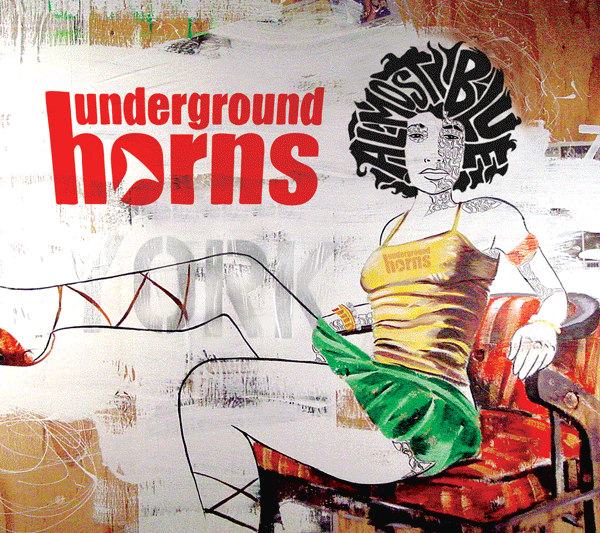
BY SAM SPOKONY | For millenia, the harrowing descent into the underworld — whether it be Egyptian, Greek or Judeo-Christian — has left mythical travelers with some infinitely valuable knowledge or possession, some new sense of truth. And while I certainly wouldn’t claim that the New York City subway turns all its resident performers into Odyssian heroes, there are those musicians whose sound, like a thick, sweeter smelling steam, rises off the platform and up through the grating in what really could be called a most holy offering to the mortal world of man.
Underground Horns, a multi-ethnic brass band who draw as much from the Afro-Cuban tradition as they do from that of New Orleans, is one of those groups that got their start — and their name — in front of subway foot traffic at Union Square or Grand Central. Now, along with maintaining that subterranean presence (generally on Friday or Saturday evenings), the group is also releasing their third studio album.
When “Almost Blue” comes out on April 4, the band will celebrate with a CD release show at Drom in the East Village — but it was actually recorded in 2012, presenting a seven-piece incarnation of the group that tears through both original material and a couple of perfectly suited covers. The 10-song release is packed with a robustly joyful spirit, which thrives on the typically soulful pairing of a persistent montuno pulse in the rhythm section (tuba, drum kit and djembe) with edgy horns (trumpet, cornet, trombone and sax) that shift between tightly close harmonies and individual flights of improvisation.
Fittingly then, Underground Horns open the album by taking jazz bassist Charles Mingus’ 1959 tune “Goodbye Pork Pie Hat” — which was composed as a slow, wailing elegy to tenor saxophonist Lester Young, who’d died that year — and deftly pumping it up into a dance-inducing, second line romp. The upbeat take on that much-revisited classic comes off successfully, rather than awkwardly or insensitively, both because of the band’s respect for Mingus’ powerful melodic theme and because the start-to-finish groove laid by tubist Chanell Crichlow and drummer Kevin Raczka provides such deeply solid support for the horn solos.
Following that are a couple of nods to the group’s musical lineage, marked most directly by “Creole,” an original by djembist Okai Fleurimont that was written to celebrate his home country of Haiti. It’s another tune that will get anyone with ears and legs up and moving, while never becoming overly self-indulgent or playful, with Fleurimont also providing vocals that bounce around the polyrhythmic beat and add a passionate spark to the mix.
But the album’s top composer is, unsurprisingly, the German-born alto saxophonist Welf Dorr — who, along with contributing five tunes, ties the band together as both its leader and a perpetually vibrant, searching soloist. A good example of Dorr’s open-minded approach is “House Song,” which apparently takes its cues from the lively atmosphere of electronica, while translating those vibes into an acoustic setting that’s nicely propelled by punctuated group horn riffs. Backed by contributions from trumpeter Andrew McGovern, cornetist Patriq Moody and trombonist Kevin Moehringer, the saxophonist ends that tune with some welcome swirls of free improvisation, expanding the sonic range while never leaving the groove behind.
Later comes the intense, head nodding rush of “Rag a Tone,” another Dorr original whose emotional chorus features the horns playing in tight harmony over a pounding, rock-influenced tuba bassline. This time, the saxophonist really tells a story with his solo by striding from honks, wails and calculated dissonance all the way back to outlining the triumphant chords of the main theme.
And just as it began with a voice from the past, the album closes with another great cover. This time it’s “Mopti,” a tune by pioneering trumpeter Don Cherry, who famously began playing with free jazz icon Ornette Coleman in the late-50s and who wrote the aforementioned number after visiting an African town of that name. Underground Horns are once again able to put their own great spin on the tune, leaving some room for the individual brass voices to step out while holding true to Cherry’s stirring melody.
So, whether you want to hit the dance floor or just feast on the aural complexities, there’s going to be something for everyone when the band plays through “Almost Blue” for their release gig at Drom. And there’s even more to get excited about, as fellow funkers Brown Rice Family — another group that knows a few things about how to blend musical traditions — will be joining the show in order to launch their new music video for “Latin Goes Ska,” a remix of the original 1964 tune by the Skatalites.
MUSIC | UNDERGROUND HORNS CD RELEASE SHOW WITH BROWN RICE FAMILY VIDEO LAUNCH PARTY
At Drom
85 Avenue A, at E. Sixth St.
Friday, April 4
Doors at 10 p.m.; Show at 11 p.m.
$10 for advance tickets, $15 at the door
For tickets, visit dromnyc.com
Visit undergroundhorns.com and brownricefamily.com



































